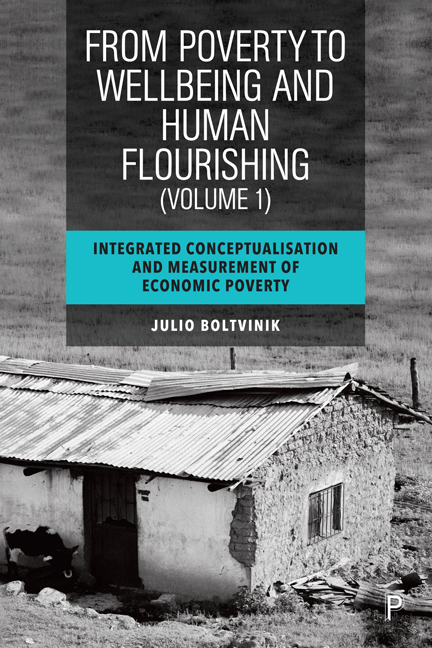 From Poverty to Well-Being and Human Flourishing
From Poverty to Well-Being and Human Flourishing 3 - Critique of the Political Economy of Poverty, Part 2: conceptual maps and definitions
Published online by Cambridge University Press: 28 March 2024
Summary
3.1 Critique of the dominant definitions of poverty in the PEP: comparison with the definitions of poverty in my New Paradigm
In Section 3.2 below I examine the predominant conception of needs (N), satisfiers (S), and resources or WBS, which as a whole I call the conceptual map of the PEP. I do this in a general fashion without referring to specific authors, with the purpose of highlighting the implications of directly dealing with the SLA, without considering the HFA. I call critical thesis the critique of an SLA built without deriving it from the HFA. The conclusions of this section, in which I examine several authors’ definitions of poverty, underpin the generalisations I arrive at in Section 3.2. As will be seen in the analysis of specific definitions, the distinction between primary and secondary WBS is lost, as well as the entire dimension of S. Both analyses are complementary and should be jointly regarded as central to the CPEP.
According to the ‘official’ Spanish dictionary DRAE, poverty is ‘the condition of lack of what is necessary to sustain life’. I have standardised the ten definitions of poverty included in Table 3.1 in line with the basic structure of the DRAE’s phrasing, identifying the terms with which each author defines ‘what is necessary’ (the means) and how they phrase what follows after ‘to ⦒ (the end). By doing so we can see how they identify the object of poverty studies. The first column of Table 3.1 contains the authors’ literal definitions, which are rephrased in the second column following the DRAE format, while the last column contains observations. The definitions have been classified in two groups: those incorporating the concept of N (definitions 1 to 5) and those based on different concepts, whether or not they explicitly reject the concept of N (definitions 6 to 10). The first group includes Altimir’s definition, Foster and Sen’s first definition, and Boltvinik’s three definitions. The first three can be classified under the conventional needs approach to poverty, while the last two belong to the approach I developed in Broadening Our Look. The second group, which also includes five definitions, has in turn been divided in two sub-groups: Townsend’s definition and Foster and Sen’s second definition (6 and 7), which I have qualified as failed searches for a new approach (FSNA), and the remaining three, which belong to the dominant economicist approach (definitions 8 to 10).
- Type
- Chapter
- Information
- From Poverty to Well-Being and Human FlourishingIntegrated Conceptualisation and Measurement of Economic Poverty, pp. 59 - 80Publisher: Bristol University PressPrint publication year: 2023


